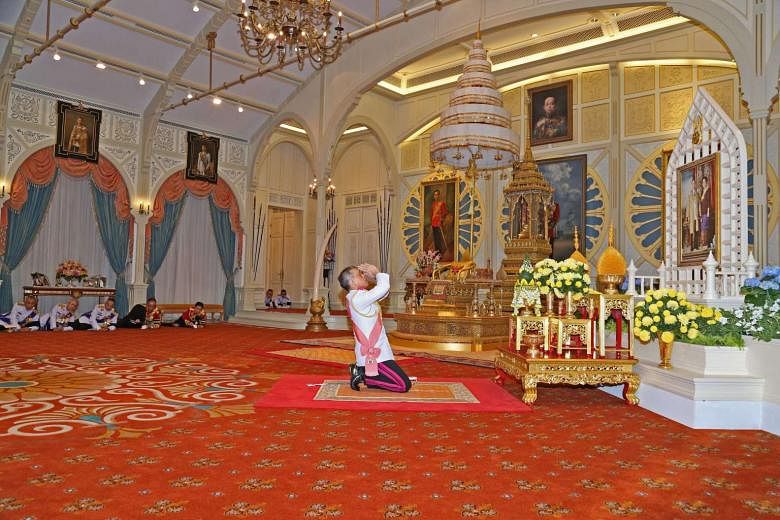BANGKOK (AFP) - Thailand's new monarch King Maha Vajiralongkorn led prayers for his late father on Friday (Dec 2), his first appearance at Bangkok's Grand Palace since he was officially appointed the day before after a seven-week delay.
The ceremony, which was broadcast live on television, offered Thais their first glimpse of their new king presiding over official duties. He is the 10th ruler of the current Chakri dynasty.
Thailand has been plunged into grief since the death of widely revered King Bhumibol Adulyadej on Oct 13 after seven decades on the throne.
The kingdom also experienced an unusual royal interregnum when Thailand's ruling junta announced that King Maha Vajiralongkorn, 64, had asked to put off officially ascending the throne to mourn his father.
The monarchy is shielded by a harsh royal defamation law making debate about its role impossible in the kingdom and forcing media to heavily self-censor.
The brief period of succession uncertainty came to an end this week with King Maha Vajiralongkorn's official proclamation as the new king capped by an acceptance ceremony on Thursday evening.
Palace officials have announced that his full title is now King Maha Vajiralongkorn Bodindradebayavarangkun. He will also be known as King Rama X.
Thailand now enters a new and uncertain era.
The late King Bhumibol's long reign spanned a tumultuous period of Thai history pockmarked by a communist insurgency, coups and street protests.
The monarchy weathered such storms by forging strong links to the country's generals, who have successfully seized power a dozen times, the latest in 2014.
It also saw breakneck development which has resulted in a huge wealth disparity between a Bangkok-centric elite and the rural poor.
To many Thais, King Bhumibol was the only consistent force in a politically combustible country.
In contrast, King Maha Vajiralongkorn has yet to achieve his father's widespread popularity and his ties to the military brass is less clear. He is also comparatively unknown to ordinary Thais.
He has chosen to spend much of his time outside the kingdom, has not given an interview for years and is protected from criticism by the lese majeste law.
He has had three high-profile divorces and seven children, four of whom are not recognised by the palace.
His latest marriage ended in 2014 after a string of his wife's family members were arrested and jailed for corruption and royal defamation. In a separate corruption probe against a clutch of close aides last year, two suspects died in military custody.
Friday's ceremony marked 50 days since King Bhumibol's death, a particularly auspicious funerary period in Thai Buddhism.
King Maha Vajiralongkorn was accompanied by his three recognised children - a daughter from his first marriage, another one from his second marriage, and 11-year-old Prince Dipangkorn Rasmijoti from his third marriage, who is being schooled in Germany.
His coronation will take place after King Bhumibol's cremation, which will not occur until after a one-year mourning period has ended.

